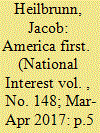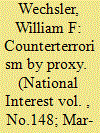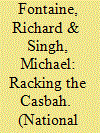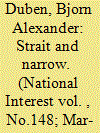|
|
|
Sort Order |
|
|
|
Items / Page
|
|
|
|
|
|
|
| Srl | Item |
| 1 |
ID:
151981


|
|
|
|
|
| Summary/Abstract |
IN HIS inaugural address, Donald Trump vowed to shun globalism and follow a policy of America First. “We do not seek to impose our way of life on anyone,” Trump said, “but rather to let it shine as an example. We will shine for everyone to follow.” His statement captured the division over American foreign policy since the founding of the republic, though it may be wondered whether Trump himself is closely acquainted with this divide. He has, after all, declared his unfamiliarity with the tenebrous origins of America First, which was once the rallying cry of a motley crew of isolationists and anti-Semites who opposed American entry into World War II. Trump’s embrace of the slogan, however, has revived a fundamental question that Americans have confronted since the founding. Should the United States intervene abroad to promote liberty and prosperity? Or should it look inward, focusing on rebuilding at home?
|
|
|
|
|
|
|
|
|
|
|
|
|
|
|
|
| 2 |
ID:
151983


|
|
|
|
|
| Summary/Abstract |
ONE OF the few things that Presidents George W. Bush and Barack Obama have in common is that they reversed their long-standing approaches to counterterrorism during their very last years in office. They initially held diametrically opposed military policies, with Bush choosing invasion and occupation and Obama preferring disengagement and drone strikes. But by the end of their second terms they had both ended up in roughly the same place, with a central focus on indirect action—enabling local forces to achieve U.S. counterterrorism objectives.
|
|
|
|
|
|
|
|
|
|
|
|
|
|
|
|
| 3 |
ID:
151989


|
|
|
|
|
| Summary/Abstract |
I NO sooner perceived myself in the world,” wrote English philosopher John Locke, “than I found myself in a storm.” Locke was referring to the maelstrom of religious fanaticism and intolerance that was tearing apart the social fabric of post-Reformation Europe. Born in 1632, Locke’s life encompassed one of the most turbulent periods of European history. The problem was not only the enmity and power struggles between Protestants and Catholics. Despite an official end to the wars of religion with the Treaty of Westphalia in 1648, militant Christianity could still destabilize governments, provoke mob violence, persecute religious dissenters and create a refugee crisis in the heart of Europe.
|
|
|
|
|
|
|
|
|
|
|
|
|
|
|
|
| 4 |
ID:
151984


|
|
|
|
|
| Summary/Abstract |
DONALD TRUMP is so singular a figure in background and temperament, so large a personality, and so seemingly immune to the usual pressures and incentives, that it is tempting to imagine that foreign policy under him will be simply the projection of his will. Think again. Like presidents before him, Trump will learn that going solo is not a recipe for an effective and enduring foreign policy. Always fraught and frustrating, the domestic politics of foreign policy have in recent years become even harder for presidents to manage. Trump will be no exception.
|
|
|
|
|
|
|
|
|
|
|
|
|
|
|
|
| 5 |
ID:
151985


|
|
|
|
|
| Summary/Abstract |
TUCKED IN the borderland between Europe and Asia sits a nation-state recognized by seven American states, New South Wales, the Basque parliament, Abkhazia, Ossetia and Transnistria, but by no country—its chief financier and defender, Armenia, included. Six hours’ drive southeast of Yerevan, you reach it through a series of dry ochre canyons that give way to rolling green steppe. At the immense skyline of the Lesser Caucasus, you cross a passport control governing no official border and a time-zone change that goes unacknowledged. You drive up the most expensive strip of pavement in Transcaucasia, joining a winding trickle of minibuses and T-72 tanks chained to the beds of semitrucks. Between mountaintops stretch nets raised to ensnare attacking helicopters. Billboards claim that the crimes of 1915 may yet be avenged. A giant statue of a grandfather and grandmother hewn out of volcanic tufa is captioned with the motto of the republic: “We Are Our Mountains.” Descending into Stepanakert, the capital, you check in with authorities and observe the trappings of statehood—parliament, police force, postal system—developed over more than two decades of sitting within Grad rocket range of Azerbaijani forces, which make regular claims that they can capture Stepanakert in four days and threaten to shoot down any planes, commercial or military, that attempt to use its airport.
|
|
|
|
|
|
|
|
|
|
|
|
|
|
|
|
| 6 |
ID:
151982


|
|
|
|
|
| Summary/Abstract |
WHEN RUSSIA launched a dramatic military intervention in Syria in fall 2015, it stunned the world and announced its return to the Middle East. Its move also surprised American policymakers, who had not long before worked with Russia in an effort to rid Syria of its chemical weapons and expressed hope that such cooperation might lead to a broader push for peace. But with its air campaign on behalf of Bashar al-Assad’s regime, Moscow signaled a willingness to intervene more decisively in Middle Eastern politics than at any time since Anwar el-Sadat’s dismissal of Soviet military advisers in 1972 and the Yom Kippur War the following year. For the first time since the end of the Cold War, any attempt to resolve a festering regional conflict must take Russia’s role into account.
|
|
|
|
|
|
|
|
|
|
|
|
|
|
|
|
| 7 |
ID:
151986


|
|
|
|
|
| Summary/Abstract |
AMONG THE four traditional geopolitical flash points in East Asia—the Korean Peninsula, the South and East China Seas, and the Taiwan Strait—cross-Strait relations between China and Taiwan have been the least likely to generate troubling headlines in recent years. This changed in early December, when President-elect Donald Trump made the controversial decision to take a congratulatory phone call from President Tsai Ing-wen—the first official interaction between a U.S. president or president-elect and Taiwan’s leader since the abrogation of formal ties between both countries in 1979. In an interview shortly afterwards, Trump appeared to question Washington’s future commitment to the “one-China” policy that had guided the U.S. approach to cross-Strait relations for nearly four decades. Trump’s actions sparked a furious reaction from Beijing and set in motion a string of provocative Chinese moves that thrust the frozen conflict over Taiwan back into the international limelight.
|
|
|
|
|
|
|
|
|
|
|
|
|
|
|
|
|
|
|
|
|